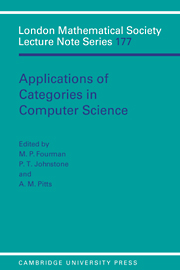 Applications of Categories in Computer Science
Applications of Categories in Computer Science Published online by Cambridge University Press: 24 September 2009
Abstract
This paper collects observations about the two issues of sequentiality and full abstraction for programming languages. The format of the paper is that of an extended lecture. Some old and new results are hinted at, and references are given, without any claim to be exhaustive. We assume that the reader knows something about λ-calculus and about domain theory.
Introduction
Sequentiality and full abstraction have been often considered as related topics. More precisely, the quest of full abstraction led to the idea that sequentiality is a key issue in the semantics of programming languages.
In vague terms, full abstraction is the property that a mathematical semantics captures exactly the operational semantics of a specific language under study. Following the tradition of the first studies on full abstraction [Milner,Plotkin], the languages considered here are PCF, an extension of λ-calculus with arithmetic operators and recursion, and variants thereof. The focus on λ-calculus is amply justified by its rôle, either as a kernel (functional) programming language, or as a suitable metalanguage for the encoding of denotational semantics of a great variety of (sequential) programming languages.
It was Gérard Berry's belief that only after a detailed sudy of the syntax could one conceive the semantic definitions appropriate for reaching full abstraction. I always considered this as an illuminating idea, and this will be the starting point of this paper.
In section 2, we shall state Berry's Sequentiality Theorem: this will require us first to recall Wadsworth-Welch-Lévy's Continuity Theorem, and then to introduce a general notion of sequential function, due to Kahn-Plotkin.
In section 3, we shall abandon sequentiality for a while to define full abstraction and quote some results.
To save this book to your Kindle, first ensure [email protected] is added to your Approved Personal Document E-mail List under your Personal Document Settings on the Manage Your Content and Devices page of your Amazon account. Then enter the ‘name’ part of your Kindle email address below. Find out more about saving to your Kindle.
Note you can select to save to either the @free.kindle.com or @kindle.com variations. ‘@free.kindle.com’ emails are free but can only be saved to your device when it is connected to wi-fi. ‘@kindle.com’ emails can be delivered even when you are not connected to wi-fi, but note that service fees apply.
Find out more about the Kindle Personal Document Service.
To save content items to your account, please confirm that you agree to abide by our usage policies. If this is the first time you use this feature, you will be asked to authorise Cambridge Core to connect with your account. Find out more about saving content to Dropbox.
To save content items to your account, please confirm that you agree to abide by our usage policies. If this is the first time you use this feature, you will be asked to authorise Cambridge Core to connect with your account. Find out more about saving content to Google Drive.